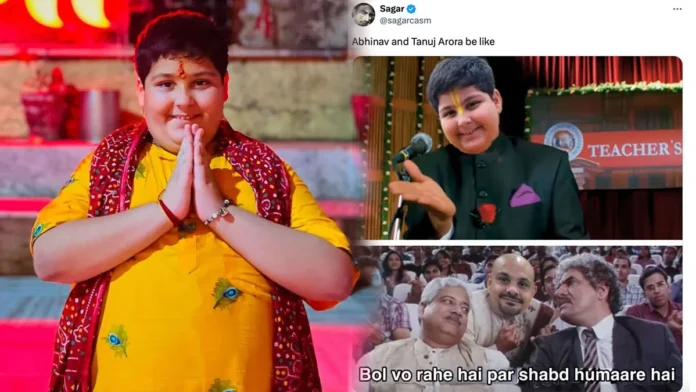Abhinav Arora, known publicly as “Bal Sant Baba,” has captivated crowds with his spiritual discourses and saintly demeanor. Adorned in traditional robes and hailed by followers as a prodigy in spirituality, the young boy’s public persona portrays an image of purity and devotion. However, behind the scenes, a very different story unfolds—one of manipulation, pressure, and the tragic loss of a childhood for profit.
A Role Imposed, Not Chosen
Sources close to the family reveal that Abhinav, only a child, was pressured into this role by his parents. Recognizing the financial potential of a “child saint,” they molded their son into a spiritual figure, encouraging him to perform religious ceremonies, deliver sermons, and maintain an aura of piety to attract devotees. Despite his outward persona, Abhinav reportedly had little personal interest in spirituality and only assumed this role to appease his parents and fulfill their ambitions.
This forced path deprived him of the chance to experience a normal childhood. While other children his age attended school, played with friends, and explored their interests, Abhinav was thrust into a world of responsibilities and expectations far beyond his years. Sources describe the young boy as often isolated, with little freedom or personal agency, and under pressure to uphold an image he never truly identified with.
The Contradictions Beneath the Surface
Though publicly known for his spiritual discipline, Abhinav’s private life reportedly clashed with the image of a strict ascetic lifestyle. Those close to him disclose that he regularly consumed chicken, a choice that sharply contradicts the vegetarian values traditionally associated with Indian saints. The dietary discrepancy highlights the pressure Abhinav faced to maintain a false image, suggesting a significant gap between his public persona and his true self.
For Abhinav, the clash between his imposed role and his personal inclinations created a cycle of inner conflict. Publicly, he was expected to adhere to strict codes of behavior and diet that matched his “saintly” image. Privately, however, he indulged in habits forbidden in his public role, exposing him to guilt and internal tension. His diet is just one example of how he grappled with these unrealistic expectations.
The Toll on Mental and Physical Well-being
Living under such intense pressure has left a deep impact on Abhinav’s mental and physical well-being. Sources close to him describe a boy who often appears weary, anxious, and withdrawn. The relentless demand to maintain his public image has robbed him of the carefreeness associated with childhood. Constantly performing and adhering to roles he does not fully understand or believe in has reportedly eroded his confidence and left him feeling trapped.
Experts suggest that children forced into public roles at a young age may suffer long-term psychological effects, including stress, anxiety, and identity confusion. For Abhinav, who has never known a life outside this imposed role, the experience could have lasting implications. The pressure to meet his parents’ expectations and public demands has made it challenging for him to understand his own identity and aspirations outside of the “Bal Sant Baba” persona.
A Childhood Lost
Abhinav’s experience sheds light on the harsh reality some children face in environments where financial gain overshadows personal well-being. What should have been years of growth, learning, and discovery have instead been spent serving the image of a “child saint.” As a result, he has been deprived of formative experiences essential for a child’s emotional and social development. He has missed out on friendships, education, and self-expression, elements crucial to any childhood.
In many ways, his story is emblematic of a wider issue: the use of children in the spiritual industry for profit. Young “saints” are often viewed as prodigies and revered by followers, but behind these displays of devotion lies the reality of children burdened with expectations far beyond their capacity.
Calls for Change and Child Rights Advocacy
Abhinav’s story has spurred calls for reform, with child rights advocates urging greater regulation in religious settings. They argue that children like Abhinav should not be forced into spiritual or public roles and that their rights to education, play, and a safe environment should be prioritized. Organizations promoting child welfare have expressed concern over the lack of oversight in such cases, where children’s lives are altered to meet the ambitions of adults.
As Abhinav’s story emerges, it serves as a reminder of the importance of allowing children the freedom to be themselves. For children forced into roles as spiritual figures, the consequences are often hidden, masked by the adulation of followers who are unaware of the personal sacrifices these children make.
The story of Abhinav Arora, or “Bal Sant Baba,” is one of lost innocence and hidden struggles. Behind the robes and rituals lies a child denied the freedom to choose his path. It is a stark reminder of the need to protect children’s rights and ensure that they are given the space to grow, dream, and discover their own identities. Abhinav’s experience highlights the importance of family support rooted in love rather than ambition and underscores the critical need for safeguarding children’s futures.

